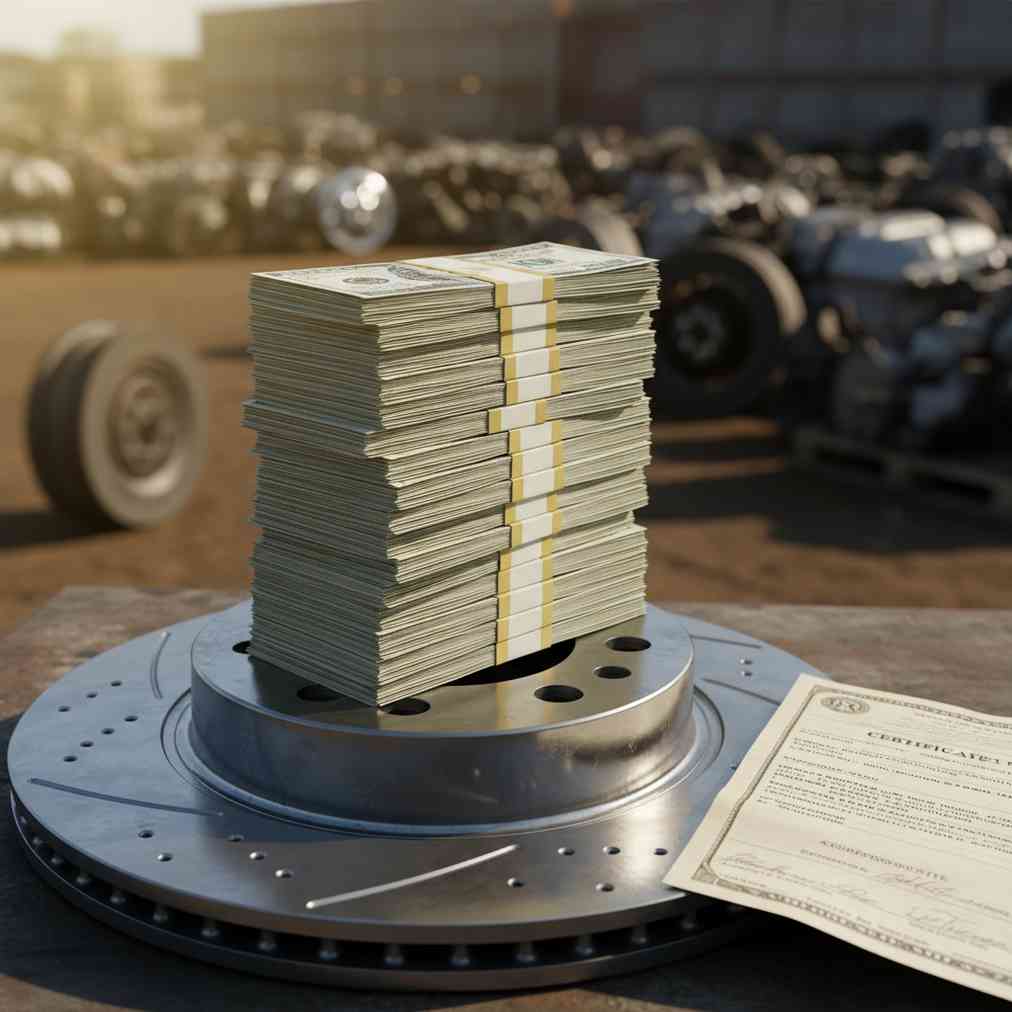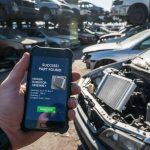Getting rid of an unwanted vehicle can be challenging when you don’t have the title in hand. Many car owners find themselves wondering whether it’s possible to junk a car without a title, and the good news is that in most cases, it absolutely is. While the process may require additional documentation and careful attention to state regulations, numerous legitimate options exist for disposing of your vehicle legally and profitably.
Understanding the Title Dilemma
The vehicle title serves as the primary legal document proving ownership of your car. When you want to sell or junk your vehicle, this document typically facilitates a smooth transaction. However, titles can be lost, damaged, or misplaced over time, leaving car owners in a difficult position when they need to dispose of their vehicle.
According to experts at VinAudit, “Although selling or disposing of a junk car without a title may appear challenging at first, there are legal options available to navigate this situation effectively.” The key is understanding that proof of ownership is paramount – while a title is preferred, it’s not always the only acceptable form of documentation.
State-by-State Variations in Title Requirements
One of the most important factors to consider is that state regulations vary significantly when it comes to junking cars without titles. What’s acceptable in one state may not be legal in another, making it crucial to research your specific location’s requirements.
| State | Title Requirement | Alternative Options |
|---|---|---|
| Texas | Not required for junk cars | Can sell to licensed salvage dealers |
| Virginia | Not required for 20+ year old vehicles | Registration and ID sufficient |
| Kentucky | Not required for 10+ year old vehicles | Registration and proof of identity |
| Connecticut | Not required for 20+ year old vehicles | Bill of sale and old registration |
| Louisiana | Flexible requirements | Alternative documentation accepted |
As noted by industry experts at Pull-A-Part, many states have provisions that make it easier to dispose of older vehicles, recognizing that titles for these cars are often lost or destroyed over time.
Alternative Documentation That Proves Ownership
When you don’t have a title, several alternative documents can serve as proof of ownership. The acceptance of these documents varies by state and individual junkyard policies, but many are widely recognized across the industry.
- Valid vehicle registration – Often the most accepted alternative to a title
- Bill of sale – Especially useful if you purchased the car but never transferred the title
- Insurance paperwork – Documents showing you as the insured owner
- Lien sale document – If you acquired the vehicle through a lien process
- Affidavit of Ownership – A sworn statement of your ownership rights
- Statement of Facts form – Some states provide specific forms for this purpose
- Valid driver’s license or state ID – Required for identification verification
According to I Buy Junk Cars Phoenix, many reputable junkyards are willing to accept these alternative forms of documentation, understanding that title issues are common among older vehicles.
The Replacement Title Option: Your Best Bet
While selling without a title is possible, obtaining a replacement title is often the most straightforward path forward. This process, though it requires some time and paperwork, can actually increase the value of your junk car and simplify the entire transaction.
Steps to Get a Replacement Title
- Contact your state DMV – Each state has its own process and requirements
- Provide vehicle details – VIN number, make, model, year, and mileage
- Submit proof of identity – Driver’s license or state-issued ID
- Pay the replacement fee – Typically ranges from $15 to $50
- Wait for processing – Usually takes 2-4 weeks to receive the new title
As explained by automotive experts at CarRight Auto, obtaining a replacement title not only makes the sale legal and straightforward but can also increase the vehicle’s value since buyers are more confident in the transaction’s legitimacy.
Financial Impact: How Much Less Will You Get?
One reality of junking a car without a title is that you’ll typically receive less money for your vehicle. This reduction occurs because junkyards and salvage dealers take on additional risk and face more complex procedures when dealing with cars that lack proper title documentation.
| Vehicle Condition | With Title | Without Title | Difference |
|---|---|---|---|
| Running condition | $1,000 – $1,500+ | $600 – $1,000 | -25% to -40% |
| Non-running condition | $500 – $1,000 | $300 – $600 | -30% to -40% |
| Severely damaged | $200 – $500 | $100 – $300 | -40% to -50% |
These price differences reflect the additional legal risks and paperwork burden that buyers must handle. However, even with reduced payments, selling your junk car can still provide valuable cash and free up space on your property.
Legal Precautions and Risk Management
When junking a car without a title, taking proper legal precautions protects you from future liability and ensures the transaction is handled correctly. Failure to follow proper procedures could leave you responsible for the vehicle even after you’ve sold it.
Essential Steps to Protect Yourself
- Research state-specific laws – Understand what’s legal in your jurisdiction
- Work with licensed dealers only – Verify the buyer’s credentials and licensing
- Keep detailed records – Document all communications and transactions
- Notify the DMV – File a release of liability to protect against future issues
- Get a bill of sale – Ensure all parties sign a detailed bill of sale
- Remove license plates – Return them to the DMV or transfer to another vehicle
“It is crucial to understand your state’s specific regulations, provide whatever legal proof of ownership is available, and notify the DMV of the sale or junking to protect yourself from future liabilities.”
– Automotive Industry Expert
Industry professionals at Taylor’s Junkyard emphasize the importance of working with reputable businesses that understand the legal requirements and can guide you through the process safely.
Finding the Right Buyer for Your Titleless Vehicle
Not all junkyards and salvage dealers are willing to purchase vehicles without titles, so finding the right buyer requires some research. However, the growing market for used auto parts has created more opportunities for sellers in this situation.
Types of Buyers That Accept Cars Without Titles
- Licensed salvage dealers – Often have procedures for handling title-less vehicles
- Scrap metal recyclers – Focus primarily on the metal value of the vehicle
- Online junk car buyers – Many explicitly advertise that they buy cars without titles
- Auto recycling centers – Specialize in breaking down vehicles for parts and materials
- Cash for cars services – Often have streamlined processes for various documentation scenarios
According to data from industry sources, services like Junk Car Medics buy junk cars with or without titles in over 30 states, indicating that this is a common scenario that many businesses are equipped to handle. When exploring cash for junk cars options, it’s worth contacting multiple buyers to compare offers and requirements.
Recent Industry Trends and Developments
The junk car industry has evolved significantly in recent years, with several trends making it easier for owners to dispose of vehicles without titles. These developments reflect both market demand and regulatory changes designed to balance fraud prevention with practical vehicle disposal needs.
Current Industry Trends
- Greater acceptance of alternative documentation – More buyers willing to work with registration and bills of sale
- Online platforms streamlining the process – Digital tools make verification and transactions easier
- Free towing services – Many buyers now include free pickup, regardless of title status
- Instant online quotes – Quick valuation tools help sellers understand their options
- Enhanced fraud prevention measures – Better systems to verify legitimate ownership through alternative means
These improvements have made the process more accessible while maintaining important protections against theft and fraud. The trend toward professional auto recycling has also created more legitimate outlets for vehicles in various documentation situations.
Step-by-Step Guide to Junking Your Car Without a Title
If you’ve decided to proceed with junking your car without obtaining a replacement title, following a systematic approach ensures the best outcome while minimizing risks.
Phase 1: Research and Preparation
- Check your state laws – Verify what’s legal in your jurisdiction
- Gather available documentation – Collect registration, insurance papers, bills of sale
- Locate your VIN number – Found on the dashboard, door frame, or engine block
- Remove personal items – Clean out all belongings from the vehicle
- Take photos – Document the vehicle’s condition and VIN location
Phase 2: Finding and Vetting Buyers
- Research potential buyers – Look for licensed, reputable businesses
- Get multiple quotes – Compare offers from different buyers
- Verify buyer credentials – Check licenses and business registrations
- Ask about their process – Understand exactly what documentation they need
- Read reviews and testimonials – Research the buyer’s reputation
Phase 3: Completing the Transaction
- Negotiate the final price – Factor in the lack of title when discussing value
- Complete all paperwork – Sign bills of sale and any required affidavits
- Get paid before transfer – Ensure payment is received before releasing the vehicle
- Remove license plates – Keep these for return to DMV or transfer
- File DMV notifications – Submit any required release of liability forms
- Keep records – Maintain copies of all documents for your files
Following this systematic approach helps ensure that you complete the transaction legally and safely while maximizing the value you receive for your vehicle. Remember that working with established salvage operations often provides the most reliable experience.
Common Mistakes to Avoid
When selling a junk car without a title, several common mistakes can create problems or reduce the value you receive. Being aware of these pitfalls helps ensure a smoother transaction.
- Failing to research state laws – Each state has different requirements and restrictions
- Not verifying buyer legitimacy – Working with unlicensed operators can create legal issues
- Accepting the first offer – Getting multiple quotes often reveals better options
- Forgetting to notify the DMV – This leaves you liable for future issues with the vehicle
- Not removing personal property – Items left in the car are typically not recoverable
- Inadequate documentation – Failing to keep proper records of the transaction
- Ignoring lien issues – Outstanding loans must be addressed before sale
As noted in comprehensive guides about selling junk cars, avoiding these mistakes can significantly improve both the financial outcome and legal safety of your transaction.
Special Considerations for Different Vehicle Types
The process of junking without a title can vary depending on the type and condition of your vehicle. Different categories of cars may have specific requirements or opportunities that affect the transaction.
| Vehicle Type | Special Considerations | Typical Value Impact |
|---|---|---|
| Classic/Antique Cars | May require additional verification, higher scrutiny | -50% or more without title |
| Luxury Vehicles | More paperwork required due to theft concerns | -40% to -60% without title |
| Commercial Vehicles | Additional licensing and documentation may be needed | -30% to -45% without title |
| Motorcycles/ATVs | Some states have different rules for non-car vehicles | -35% to -50% without title |
| Fleet Vehicles | Corporate documentation may substitute for individual titles | -25% to -35% without title |
When dealing with specialty vehicles, it’s particularly important to work with experienced buyers who understand the unique requirements. Certain vehicle types may have additional value even in junk condition, making proper documentation even more critical.
Environmental and Economic Benefits
Despite the challenges of selling without a title, junking your car provides significant environmental and economic benefits that make the effort worthwhile. Understanding these broader impacts can provide motivation to complete the process properly.
Environmental Impact
- Metal recycling – Steel and aluminum from cars can be recycled indefinitely
- Hazardous material disposal – Proper handling of fluids, batteries, and other toxic substances
- Parts reuse – Functional components extend the life of other vehicles
- Space conservation – Removes abandoned vehicles from properties and communities
- Energy savings – Recycled metals require less energy to process than new materials
Economic Benefits
- Immediate cash – Even without a title, you can still receive payment for your vehicle
- Property value – Removing junk cars can improve property appearance and value
- Cost avoidance – Eliminates ongoing registration, insurance, and storage costs
- Tax benefits – In some cases, donation may provide tax advantages
- Supporting local economy – Transactions with local salvage yards support community businesses
The auto recycling industry plays a crucial role in both environmental protection and economic activity, making your participation valuable even when documentation challenges exist.
Alternative Options When Junking Isn’t Possible
In some cases, legal restrictions or documentation issues may make junking your car without a title impossible in your situation. When this occurs, several alternative options can still help you dispose of the vehicle responsibly.
- Donate to charity – Some organizations accept vehicles without titles for parts or scrap
- Part out yourself – Remove and sell valuable components individually
- Abandon vehicle programs – Some municipalities have programs for disposing of abandoned cars
- Private scrap arrangements – Direct sales to metal recyclers (where legal)
- Long-term storage – Keep the vehicle until title issues can be resolved
While these alternatives may not provide the same immediate financial benefit as selling to a junkyard, they can still help you dispose of the vehicle responsibly. Donating a car to charity can sometimes provide tax benefits that offset the lack of immediate cash payment.
Conclusion: Making the Right Choice for Your Situation
Junking a car without a title is not only possible but quite common in today’s automotive landscape. While the process requires more effort and typically results in lower payments, it provides a legitimate way to dispose of unwanted vehicles while generating some cash and contributing to environmental sustainability.
The key to success lies in understanding your state’s specific requirements, gathering appropriate alternative documentation, and working with reputable buyers who follow proper legal procedures. Whether you choose to obtain a replacement title first or proceed with alternative documentation, taking a systematic approach protects your interests and ensures a smooth transaction.
Remember that the automotive recycling industry exists specifically to handle these types of situations, and many businesses are well-equipped to work with sellers who lack traditional title documentation. By following the guidelines outlined in this article and taking proper precautions, you can successfully convert your unwanted vehicle into cash while contributing to the important work of automotive recycling and parts reuse.
Whether your car is running, damaged, or completely inoperable, opportunities exist to dispose of it responsibly and profitably, even without a title in hand. The most important steps are researching your options, understanding the legal requirements in your area, and choosing reputable partners for the transaction.





Leave a Reply
You must be logged in to post a comment.